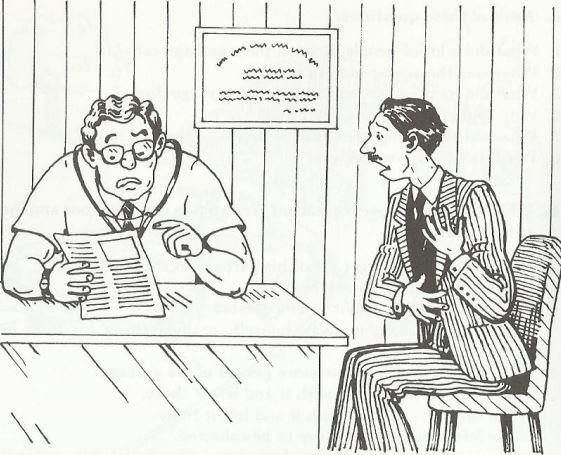
I feel very good
 المؤلف:
L.A Hill
المؤلف:
L.A Hill
 المصدر:
Intermediate anecdotes in American English
المصدر:
Intermediate anecdotes in American English
 الجزء والصفحة:
24-1
الجزء والصفحة:
24-1
 15/9/2022
15/9/2022
 1093
1093

Mr. Harris had ever married, and he lived in a small house by himself. He was always very careful about what he ate and drank, and he never went out when the weather was cold. He was always afraid that he was getting some terrible disease, so he often went to see his doctor, and the doctor was getting very tired of his patient's imagined illnesses, because he had more important work to do.
Then one day Mr. Harris hurried into the doctor's office and told him he was sure he had a certain terrible disease which he had read about in the newspaper. He showed the doctor the article. The doctor read it carefully and then said, "But, Mr. Harris, people don't know when they have this disease! There are no symptoms, and they feel very good."
"Oh, my goodness!" said Mr. Harris. "I thought so. That's just how I feel!"
A. Answer these questions:
- Why did Mr. Harris often go to see his doctor?
- How did the doctor feel about this?
- What did Mr. Harris show the doctor one day?
- What did the doctor do with this?
- What did the doctor say to Mr. Harris?
- What did Mr. Harris answer?
B. Write these sentences. Put it or so in each blank space, but only if a word is needed.
- The doctor said, "People who have this disease feel very good," and Mr. Harris answered, "I thought ______________”
- Mr. Harris told the doctor a good story, but the doctor didn't believe ________.
- The doctor told another doctor what he thought was wrong with Mr. Harris, and the other doctor agreed _________.
- "Was Mr. Harris sad when he heard that he was not ill?" "Yes, I'm afraid________.
- "Will he ever stop worrying?" "I doubt _______.
- "Do you think he'll live to be a hundred?" "I don't know. I never thought about________.”
- "Did he ever smoke or drink?" "Yes, I imagine _______________.
- "Will he find some new disease to worry about next week?" "Yes, I suppose ____________.
C. Draw lines from the words on the left to the correct words on the right. Then write out the five correct sentences.
1. Mr. Harris a. didn't know that they had it
2. Mr. Harris's doctor b. had appeared in a newspaper
3. People who had the disease c. had no symptoms.
4. The article about the terrible disease d. was always imagining that he was ill
5. Mr. Harris thought he had the disease e. was getting tired of his patient's visits.
because he.
 الاكثر قراءة في Intermediate
الاكثر قراءة في Intermediate
 اخر الاخبار
اخر الاخبار
اخبار العتبة العباسية المقدسة


